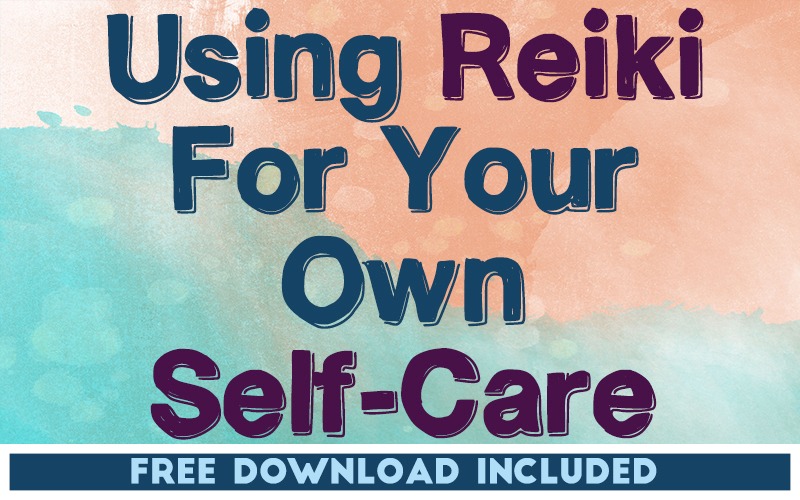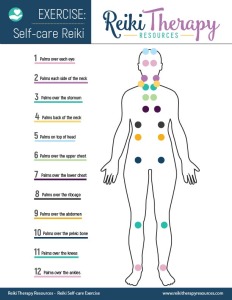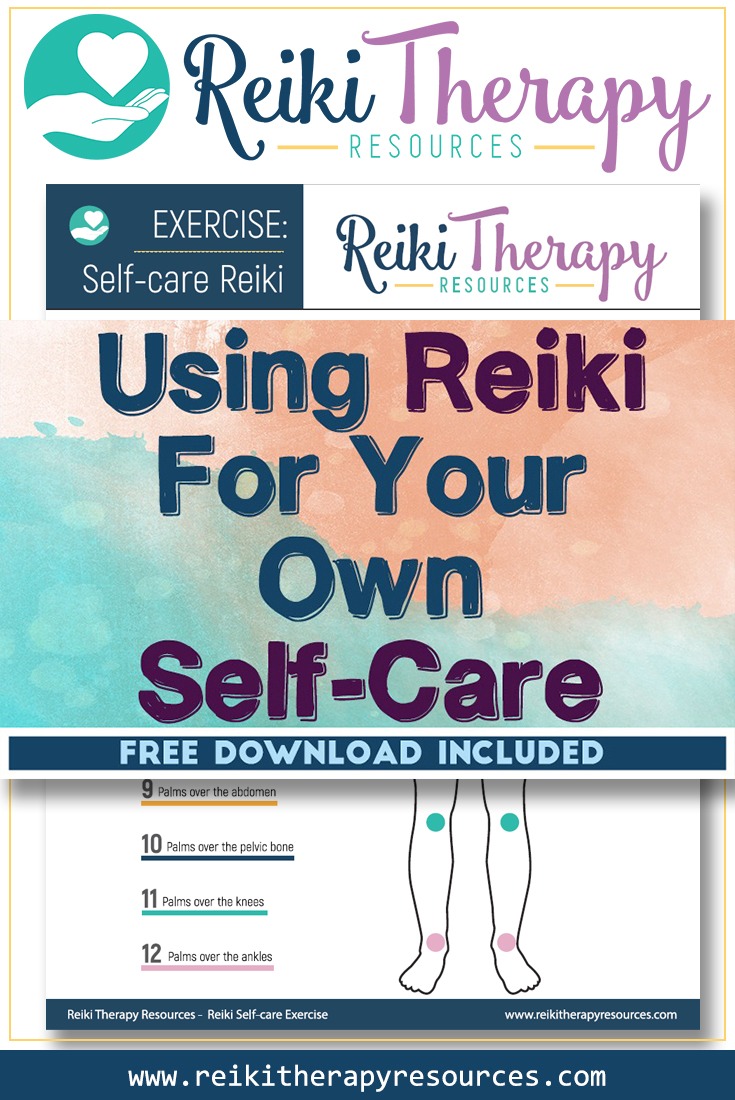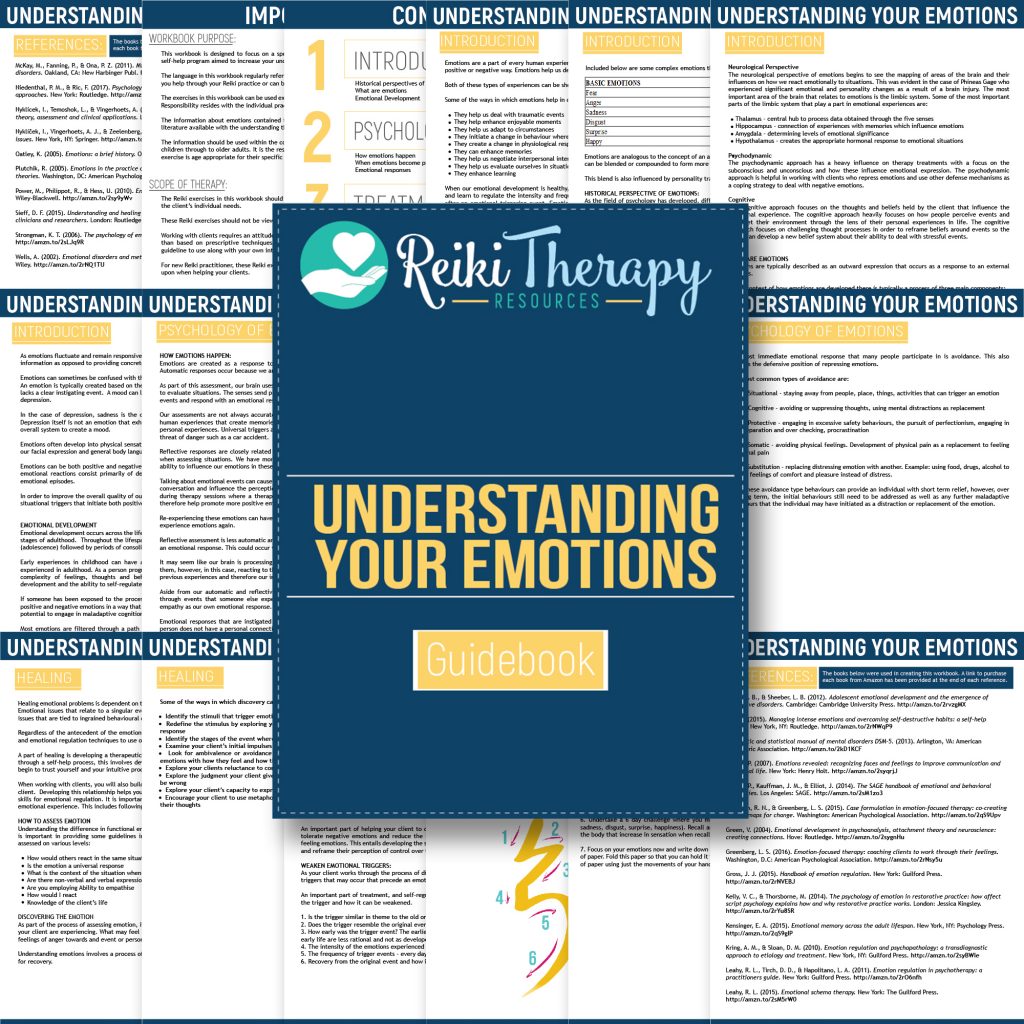
THIS POST INCLUDES:
——————————————–
1. Introduction to self-care
2. Developing a self-care plan
3. Self-care activities and resources
4. Free Download Self-care Activities List
INTRODUCTION TO SELF-CARE
Self-care is important care provided by you to you to meet your physical and psychological needs. Self-care should also be an important part of your client’s life that you as a Reiki practitioner can help them develop.
Practitioners working in the wellness field are especially vulnerable to absorbing the stresses and pressures of working with clients who come to Reiki with a goal of improving their own health and wellness. Additionally, Reiki practitioners also experience the same personal struggles that everyone else does. This includes stress with relationships, work, finances, and physical health. Those working within the wellness field are also at risk of burnout due to the highly interpersonal nature of their work with other clients.
In addition to the benefits of educating clients about self-care, Reiki practitioners are also encouraged to model self-care behaviours amongst the Reiki profession.
The effects of life stresses and professional burn out can impact a Reiki practitioners ability to provide support to their clients in their professional role. If a Reiki practitioner is feeling exhausted and tired from stress, it becomes difficult to work with clients with a healing level of energy. By regularly participating in self-care activities, you can help reduce stress and provide an outlet for the accumulation of professional stress.
Self-care is both a healing process and a preventative process in terms of looking after our health. We can engage in self-care when stresses have already built up, however, we can also engage in preventative self-care that can help reduce the potential for future stresses that accumulate.
Self-care activities can also help broaden the Reiki practitioners experience of wellness which can impact their attention to care that they provide clients. Self-care can help develop a positive mindset that is interested in growing your Reiki practice and developing skills and services that will ultimately positively impact your clients.
Self-care is beneficial in many ways:
- promoting good physical health
- healing and preventative care for mental health issues
- stress reduction and management of future stres
- developing emotional support
- developing supportive relationships
- developing a balance between personal and work life
DEVELOPING A SELF-CARE PLAN
When developing a self-care plan it is important to create a plan that is both achievable and unique to the preferences of the person undertaking the self-care. For example a self-care activity may involve exercise, however, you will achieve more compliance success by undertaking a favorable activity. This might mean engaging in gardening instead of weight lifting. The self-care plan should include activities that facilitate the process of beneficial physical and emotional health.
Your self-care plan can be as complex or as simple as you like, however, it is important to keep the following principles in mind when creating your self-care plan:
- regular breaks during the day
- regular exercise, healthy eating, restful sleep
- awareness of your emotions
- regular assessment of your self-care plan
Let’s look at these steps in more detail:
REGULAR BREAKS DURING THE DAY
It is beneficial to schedule your client appointments with breaks in between each appointment. This will provide you with time to recharge between each client session as well as provide you with time to reflect between each client so that you can provide your full attention to each client.
As you become more experienced in your Reiki practice you will develop a sense of the time you need to take between each client to recharge. It’s important not to view the breaks as a task that needs to be completed as soon as possible.
Instead, each break should provide you with enough time to provide distance between each client and the emotional experiences they may bring to your Reiki practice room. You should also allow time to recenter your thoughts on the next client so you are fully present for them and the needs they have in their session.
This process of managing breaks between client work is not predictable. Therefore it’s important to maintain awareness about your responses to client work and adapt your requirements for a break as you plan your day.
You might also want to use breaks between sessions to journal your reflection in a digital or handwritten journal to help release any pervasive thoughts. Be mindful that your journaling should relate to your personal thoughts and should not record any personal information about clients.
REGULAR EXERCISE, HEALTHY EATING, RESTFUL SLEEP
In addition to developing self-care in your professional life, it’s essential to develop self-care in your personal life. Taking care of the essential areas in your physical life includes establishing a regular exercise practice, eating healthy nutritious food and maintaining a result sleeping schedule.
If any of these areas are imbalances, you can use strategies to help implement and maintain new habits.
- Exercise or play physical games with family and friends
- Prepare healthy meals in advance to avoid impulse eating
- Establish a routine that promotes restful sleep
- Use tracking apps or systems to stay accountable
- Set goals and rewards to establish routines
- Undertake activities that are enjoyable, simple and achievable
- Focus on one major change at a time
AWARENESS OF YOUR EMOTIONS
It is important to stay connected to your emotional experience in wellness practices such as Reiki. As a Reiki practitioner, you are constantly exposed to other people’s emotional experiences and this can sometimes impact your own emotional wellbeing.
There are a number of strategies you can introduce to your self-care plan to protect your emotional well-being:
- Seek your own Reiki therapy
- Engage in meditation to assist with reducing feelings of tension
- Use complementary therapies to support your Reiki practice
- Seek talk therapy with a counsellor or trusted friend
It is important to identify when you are experiencing emotional distress either through experiences in your role as a Reiki practitioner or by issues in your personal life. You are vulnerable to experiencing difficulties like anyone else, however, there is an added vulnerability when wellness practitioners believe they are using their own coping strategies and neglect to seek help when required.
If you would like to explore art therapy and emotions in further detail, we have a Reiki Guidebook to Understanding Your Emotions available in the store.
The main topics covered include:
- Introduction to emotions
- Psychology of emotions
- Inner Healing
- Self-regulation
- Inner Healing Exercises
REGULAR ASSESSMENT OF YOUR SELF-CARE PLAN
It’s important to regularly assess your self-care commitment to determine if your physical, emotional and professional needs are being met. You may want to introduce a regular review of your self-care plan that reflects on your weekly or monthly self-care activities. This will help you pay attention to current events in your life as they occur.
It’s useful to have a self-care plan that addresses your daily needs as well as exploring activities you would undertake if you were to experience an emotional crisis through a professional or personal event. If you were to experience a distressing situation in your professional work, who would you contact? Have you ever considered any resistance you might hold to seeking help for yourself if you needed to?
We are all vulnerable to self-sabotaging activities that detract from our own physical and emotional well-being. It is useful to develop a tracking system that will help you stay aware of the self-care you are undertaking. Sometimes we may think we are taking care of ourselves, however, with the busy nature of life, a week can pass before we realised we have had regular sleep. You can choose to use a digital tracking system through the use of an app or spreadsheet, or you can manually track your self-care by using a pen on a calendar to mark the days you do your self-care activity.
Tracking your self-care activities can provide you with the tangible proof that you are undertaking good self-care habits. If over time, you realise you are not undertaking a much self-care as you want, you can reflect on any resistance you may be experiencing.
If you are experiencing resistance, ask yourself:
- Are your self-care goals realistic?
- Can you modify your self-care activities?
- Do you have too many self-care goals?
- Are you making your self-care activities a priority?
Involving friends, family or colleagues can help you stay committed to a self-care plan. For example, you may ask family members to help you create healthy meals or regularly walk with a friend. You may also network with other Reiki professionals and develop a self-care network to provide support and encouragement for each other.
CREATE YOUR SELF-CARE PLAN
Below are some things to consider when creating your self-care plan:
- How do you deal with stress now? List both negative and positive strategies that you currently use to deal with stress.
- What negative coping strategies would you like to eliminate? Construct a plan to help achieve this goal.
- What self-care activities do you enjoy that contribute to your physical well-being?
- What self-care activities do you enjoy that contribute to your emotional well-being?
- What self-care activities do you enjoy that contribute to your relationships?
- What self-care activities help deal with difficult client sessions?
- What obstacles could prevent you from implementing your self-care plan? How can you address these obstacles?
- Implement a tracking system for your self-care activities.
- Who can you share your self-care plan with? Who can you recruit to help you implement different self-care activities?
FREE DOWNLOAD
SIGN UP below to receive your FREE DOWNLOAD. Once you enter your email address, you will receive access to the Free Reiki Self-care Body Map.

BUILD YOUR REIKI REFERENCE MATERIALS:
Pin this image to your Pinterest board.

SHARE KNOWLEDGE & PASS IT ON:
If you’ve enjoyed this post, please share it on Facebook, Twitter, Pinterest. Thank you!

